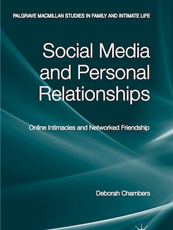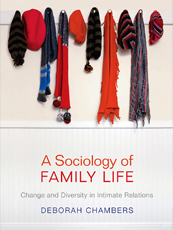Deborah Chambers
Social Media and Personal Relationships: Online Intimacies and Networked Friendship
Overview
One of the most striking changes during late modernity has been the use of social media to conduct personal relationships. Despite the huge growth in Facebook ‘friendships’ which now number in the billions, new media technologies are often blamed for a breakdown of community, the erosion of family values and a lack of ‘genuine’ social bonds.
In Social Media and Personal Relationships (2013) Deborah Chambers addresses these social anxieties. She asks: how do people engage with social media to build, maintain and display networks? What does it mean to be ‘friends’ in an online context? Is social media transforming our personal lives? Contesting the view that heavy social network site users are more isolated than occasional users, Chambers argues that sites such as Facebook are forging new ways of ‘doing intimacy’. She demonstrates that despite the remarkable technological possibilities for global networking, most people’s online connections remain predominantly personal and local.
Part of the Palgrave Macmillan Studies in Family and Intimate Life series, the book explores key features of our networked society and the changing nature of intimacy and ‘friendship’ in an online context. Chambers critically engages with research from a number of fields to explain how, and why, people digitally share their lives with each other.

Context
Drawing on a range of emerging research, Chambers argues that social network site technology offers us ever more complex and varied ways to connect to large numbers of people. However, this technology is mainly used to sustain close, personal ties with the majority being pre-existing connections. Chambers also explains that online communication is now intricately embedded into our everyday lives, and forms a central part of today’s personal modes of communication and engagement.
Chambers combines sociological debates about intimacy, family, friendship and new social ties with media studies of computer-mediated communication to develop a theory of ‘mediated intimacies’. Rejecting the impulse to differentiate between online and offline relationships in this original framework, she re-visits the concept of ‘intimacy’ from a range of theoretical and methodological angles. Chambers explains the distinctive ways in which new media technologies are being experienced to sustain personal connections and explores the nature of these connections within the frame of networked public culture.
The book critically investigates digitally mediated social relationships through a series of social and cultural contexts within five core themes:
- The presentation of the online self
- Teenage friendships
- Home, families and new media
- Digital dating
- Virtual community and online social capital
By engaging with key academic concepts, debates and studies from a variety of disciplines in relation to interviews carried out with students in North East England, Chambers explores the social consequences of public displays of intimacy and changing personal communities in relation to notions of privacy, intimacy, trust, social capital and ‘the personal’.
Outcomes
Through the lens of ‘mediated intimacies’, and in relation to the five broad themes identified, Chambers concludes that the concept of ‘friendship’ so widely employed in today’s digital epoch entails contradictory tendencies. She argues that mediated relationships tend to be articulated and negotiated through highly personal channels of communication (which may be highly public at the same time) that bring the technical and the emotional together. As a result, social networking technologies can support relationships that are casual, transient and playful and those that are intense and enduring. Moreover, Chambers highlights the Aristotelian attributes of ‘friendship’ as the ideal relationship: reciprocal, respectful, voluntary and highly valued, as demonstrated in opportunities offered by social network site technology to revive social ties and mend the fractures that arise in our life trajectories.
Chambers also addresses the moral questions raised by the ability to conduct intimacy at a distance. Social media offer technological opportunities to upset, demoralize and humiliate others. She explores the varying ‘media ideologies’ and ethical issues thrown up by social media engagement in relation to choice of medium and the accountability of users. She investigates the ways in which individuals engage in practices of identity construction and self-regulation though such mediated relationships, and looks at the potential for mediated selves to evolve new modes of citizenship and self-representation.
Finally, while arguing against moral panics about the loss of the kinds of community values associated with face-to-face communication, the book considers the implications of commercial imperatives. Targeted marketing agendas are embedded within online personal conversations which impinge on users’ sense of trust and privacy, and raise ethical issues about power, protection and state regulation.
As one of the first studies to address the ways in which social media technology contributes to a dramatic reconfiguration of ideas concerning intimacy, family and friendship, Social Media and Personal Relationships is a primary point of reference for those interested in changing intimacies and meanings of friendship as well as the ethical dilemmas and social opportunities generated by social media.
Further Information
Chambers D. Social Media and Personal Relationships: Online Intimacies and Networked Friendship. London: Palgrave Macmillan, 2013.
Information on other books as part of the Palgrave Macmillan Studies in Family and Intimate Life series can be found here.
A Sociology of Family Life: Change and Diversity in Intimate Relations
Overview
New kinds of intimate relationships such as post-divorce families, co-habiting couples, ‘friends as family’ and same-sex unions are now commonplace. Yet rising divorce rates, teenage pregnancies, single-parenthood and same-sex unions are often perceived as a threat to societies’ core values. These trends generate public debate about ‘good’ and ‘bad’ parenting and the collapse of moral standards within families. Indeed, the welfare of children and elderly relatives is viewed as a major political issue at a time when complex forms of commitment and care are forming, and when governments in many countries are reducing social welfare provisions.
In A Sociology of Family Life Deborah Chambers explores the growing diversity of family life and challenges notions of moral decline by revealing the remarkable persistence of commitment and reciprocity across cultures within traditional and new family relations. Presenting a comprehensive assessment of recent and transnational research and theory, the book documents and analyzes the growing variations in personal and family life and assesses contemporary modes of intimacy.
By foregrounding new thinking about the family, parenting, childhood and personal life, Chambers is one of the first to examine these major debates from a global perspective. As such A Sociology of Family Life offers an important expansion to the range and depth of current research.

Contect
Chambers critically assesses key theoretical perspectives about ‘the family’ and changing intimacies alongside case study examples of family and personal life from non-western societies. She explores a range of topics including traditional approaches to the family, theories of individualization and intimacy, parenting values and practices, the changing nature of childhood, ageing societies, globalization and migration patterns, fertility and new reproductive technologies.
Significantly, the book considers transforming intimacies and family lives from a global dimension. Trends in the USA, UK and Europe are examined alongside case study examples from non-western societies such as India, China and the Middle East. The latter contrast with and challenge western assumptions about ‘the family’. Chambers assesses the ways in which families negotiate wider and large-scale social systems, including, for example, the interconnections between globalization and marriage strategies and the regulation of families through state policies as well as local cultural customs. The following broad questions are used to frame these issues:
- Is there sufficient research to support the influential idea of a ‘democratization’ of family and intimate relationships, or do gender inequalities persist?
- Is a growing diversity in intimate relationships leading to a crisis of commitment and care in western societies?
- Is research on same-sex intimacies forcing a re-consideration of the concept of ‘family’?
- Are sociological debates about family life ethnocentric?
Throughout the book, Chambers uses empirical research evidence about family life to highlight existing discrepancies and levels of abstraction in social theories to understand both the macro and micro-social dynamics of family life.
Outcomes
Chambers concludes A Sociology of Family Life by addressing three interrelated themes: popular notions of a decline in family values, diversity in contemporary intimate relationships and the need to develop a global dimension within sociological approaches to the family.
While research findings repeatedly emphasize the strength and durability of family and intimate ties, Chambers demonstrates that, in the UK and USA, a discourse of ‘family values’ is articulated by politicians, religious leaders and the media to privilege and normalize the ‘nuclear family’ form. She argues that this privileging of a singular and predominantly white middle-class family arises from an ethnocentric perspective on changing family relations. Chambers shows how the idea of a ‘proper family’ is often used as a political football. Family values rhetoric, regularly advanced by US presidents and British prime ministers, forecloses certain kinds of arguments and fuels a media-led backlash against several intimate relationships and households including single mothers, Black mothers, working mothers, absent fathers and lesbian and gay unions.
Addressing such ideological assumptions and misconceptions, Chambers provides a comprehensive re-examination of recent scholarship and identifies relevant concepts for the study of diversity in families and intimate relationships. In particular, she argues for understandings of personal life and family practices that avoid stigma and prejudice yet remain sensitive to the intersections of sexual, ethnic, gender and class identities and inequalities. Finally, she considers the far-reaching consequences for changing family dynamics on the global stage, identifying tensions between traditional and late modern notions of the self that impact upon, for example, approaches to family-based welfare and public welfare.
The impact of Chambers’ work is twofold. First, the book identifies the richness and complexity involved in contemporary intimate relations. Second, it draws attention to significant shortcomings in social policy and a gap between western theories and the realities and constrains of family life in non-western cultures in relation to family planning; arranged and transnational marriages and reproductive technologies; welfare provision for the elderly; the pressures of childcare for post-divorce families.
This book has been selected by Choice as a 2013 Outstanding Academic title.
Further Information
Chambers D. A Sociology of Family Life: Change and Diversity in Intimate Relations. Cambridge: Polity Press, 2012.
